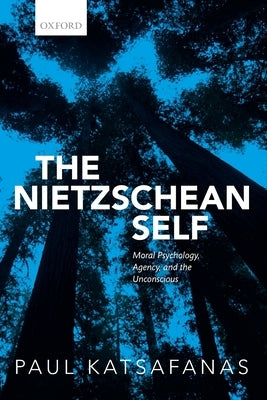1
/
of
1
Oxford University Press, USA
The Nietzschean Self: Moral Psychology, Agency, and the Unconscious
The Nietzschean Self: Moral Psychology, Agency, and the Unconscious
Regular price
€29,95 EUR
Regular price
Sale price
€29,95 EUR
Shipping calculated at checkout.
Quantity
Couldn't load pickup availability
Nietzsche's works are replete with discussions of moral psychology, but to date there has been no systematic analysis of his account. How does Nietzsche understand human motivation, deliberation, agency, and selfhood? How does his account of the unconscious inform these topics? What is
Nietzsche's conception of freedom, and how do we become free? Should freedom be a goal for all of us? How does--and how should--the individual relate to his social context? The Nietzschean Self offers a clear, comprehensive analysis of these central topics in Nietzsche's moral psychology. It
analyzes his distinction between conscious and unconscious mental events, explains the nature of a type of motivational state that Nietzsche calls the 'drive', and examines the connection between drives, desires, affects, and values. It explores Nietzsche's account of willing unity of the self,
freedom, and the relation of the self to its social and historical context. The Nietzschean Self argues that Nietzsche's account enjoys a number of advantages over the currently dominant models of moral psychology--especially those indebted to the work of Aristotle, Hume, and Kant--and considers the
ways in which Nietzsche's arguments can reconfigure and improve upon debates in the contemporary literature on moral psychology and philosophy of action.
Author: Paul Katsafanas
Publisher: Oxford University Press, USA
Published: 02/13/2019
Pages: 304
Binding Type: Paperback
Weight: 1.05lbs
Size: 9.10h x 6.10w x 0.70d
ISBN: 9780198837107
Nietzsche's conception of freedom, and how do we become free? Should freedom be a goal for all of us? How does--and how should--the individual relate to his social context? The Nietzschean Self offers a clear, comprehensive analysis of these central topics in Nietzsche's moral psychology. It
analyzes his distinction between conscious and unconscious mental events, explains the nature of a type of motivational state that Nietzsche calls the 'drive', and examines the connection between drives, desires, affects, and values. It explores Nietzsche's account of willing unity of the self,
freedom, and the relation of the self to its social and historical context. The Nietzschean Self argues that Nietzsche's account enjoys a number of advantages over the currently dominant models of moral psychology--especially those indebted to the work of Aristotle, Hume, and Kant--and considers the
ways in which Nietzsche's arguments can reconfigure and improve upon debates in the contemporary literature on moral psychology and philosophy of action.
Author: Paul Katsafanas
Publisher: Oxford University Press, USA
Published: 02/13/2019
Pages: 304
Binding Type: Paperback
Weight: 1.05lbs
Size: 9.10h x 6.10w x 0.70d
ISBN: 9780198837107
About the Author
Paul Katsafanas, Associate Professor of Philosophy, Boston University
Share


